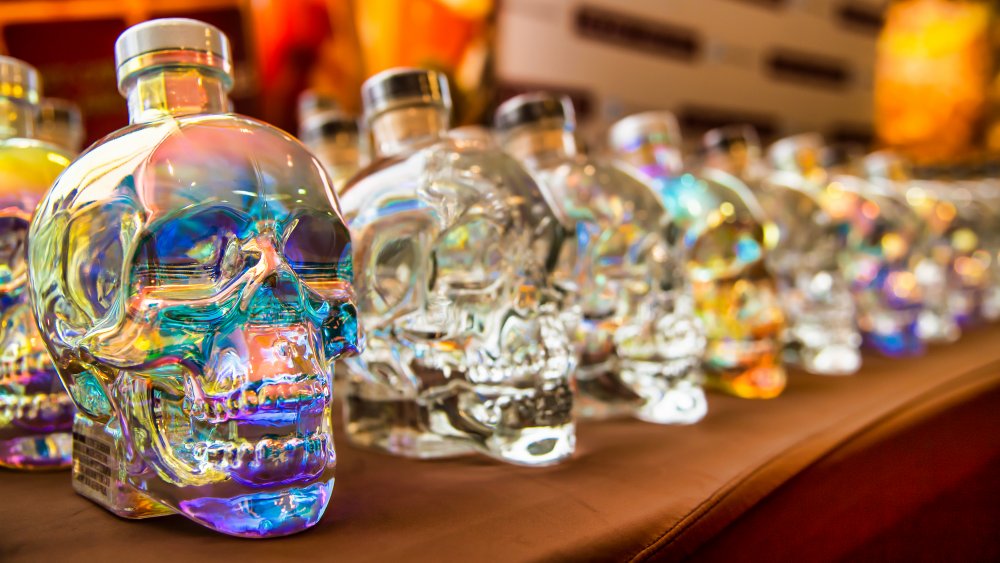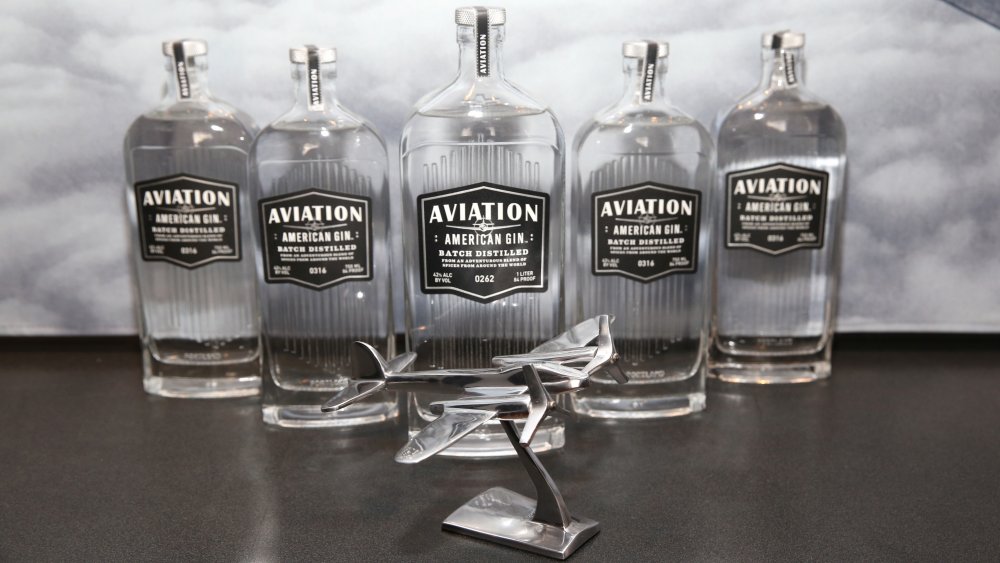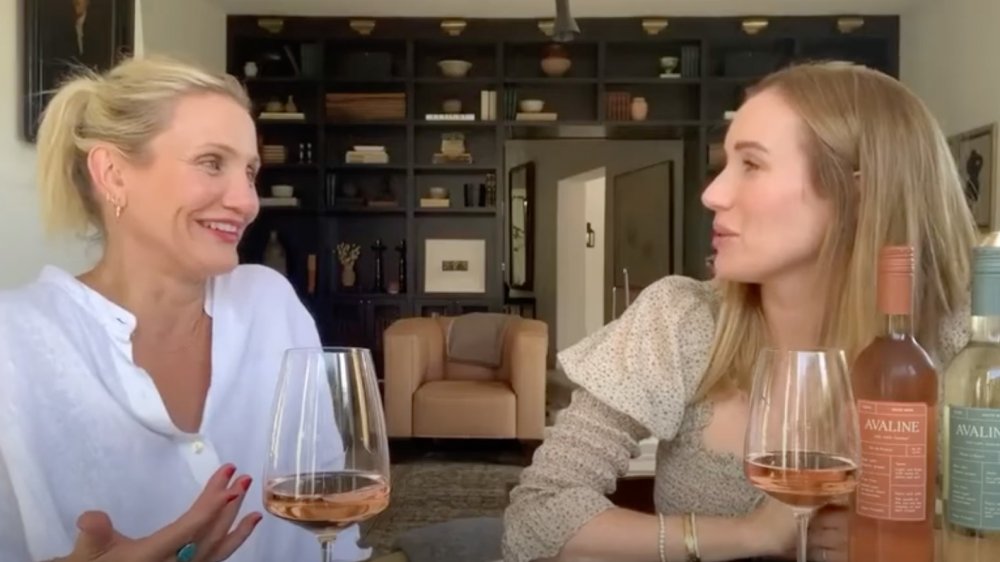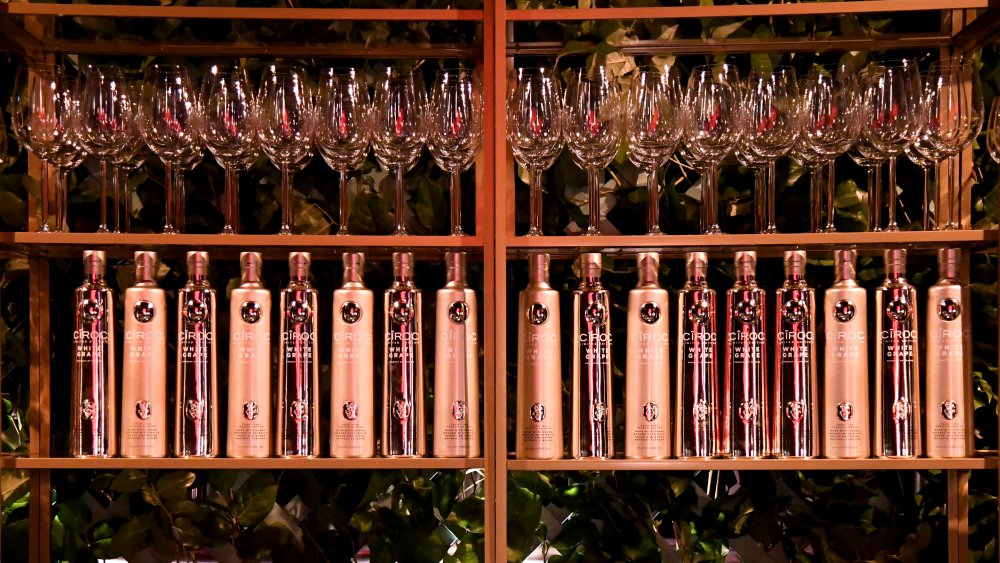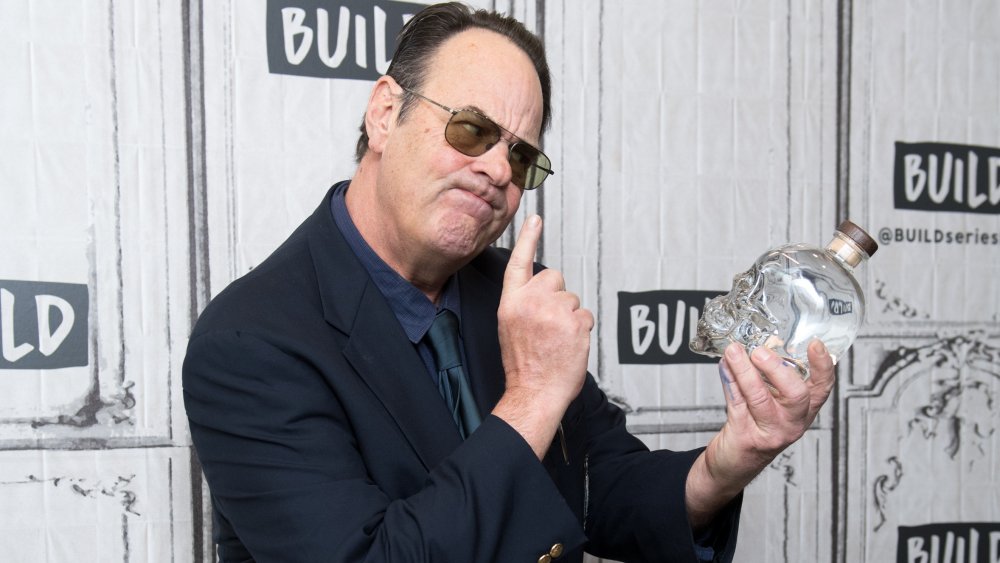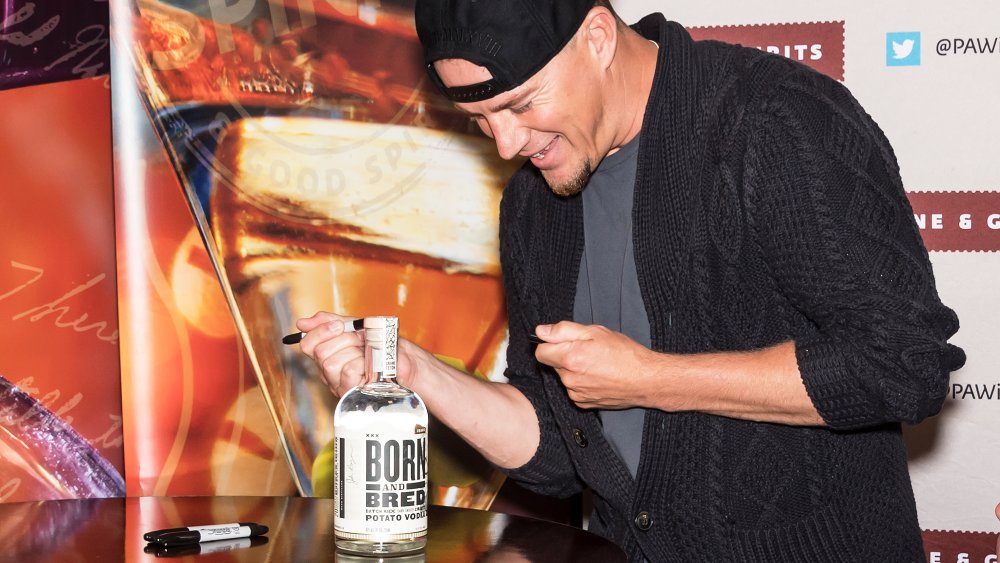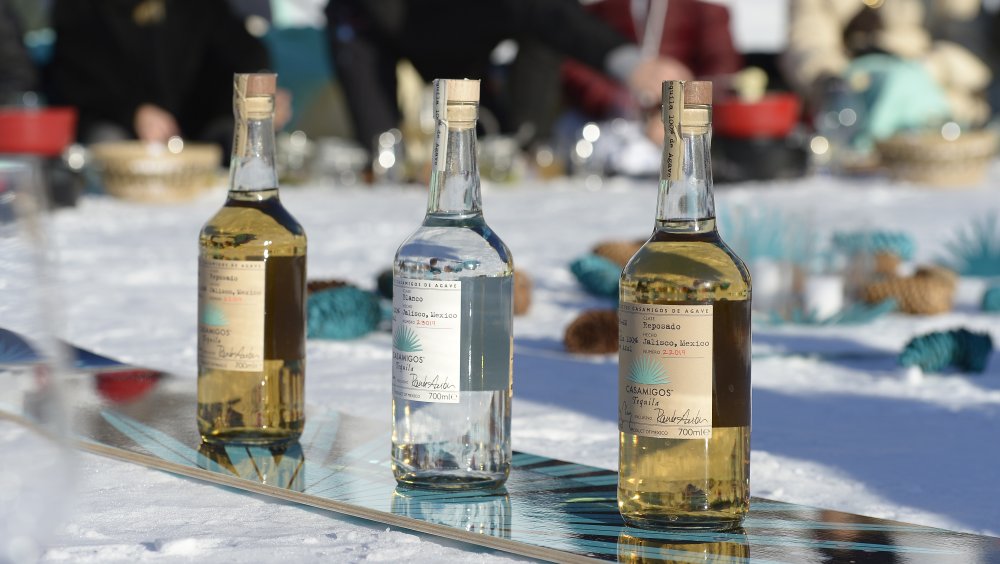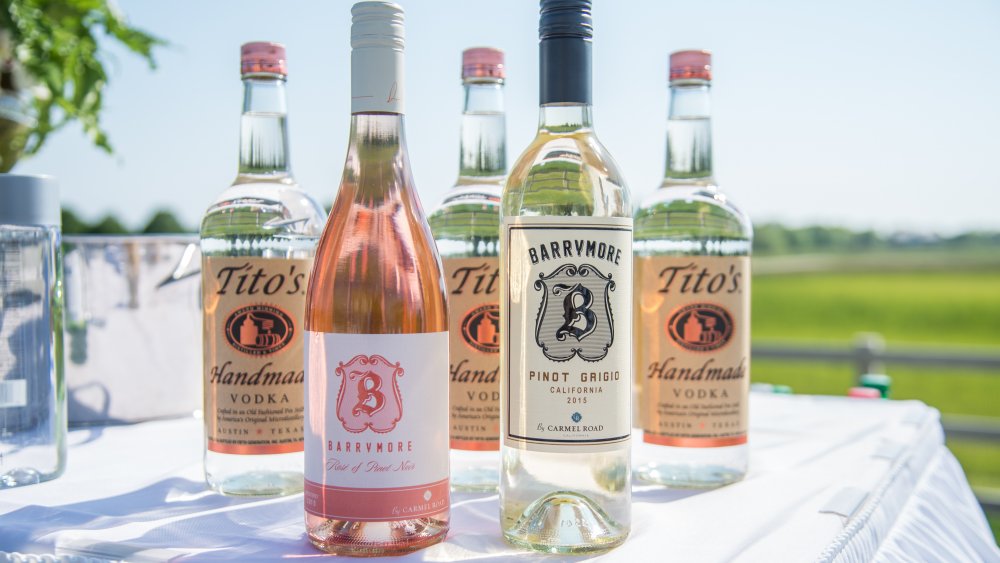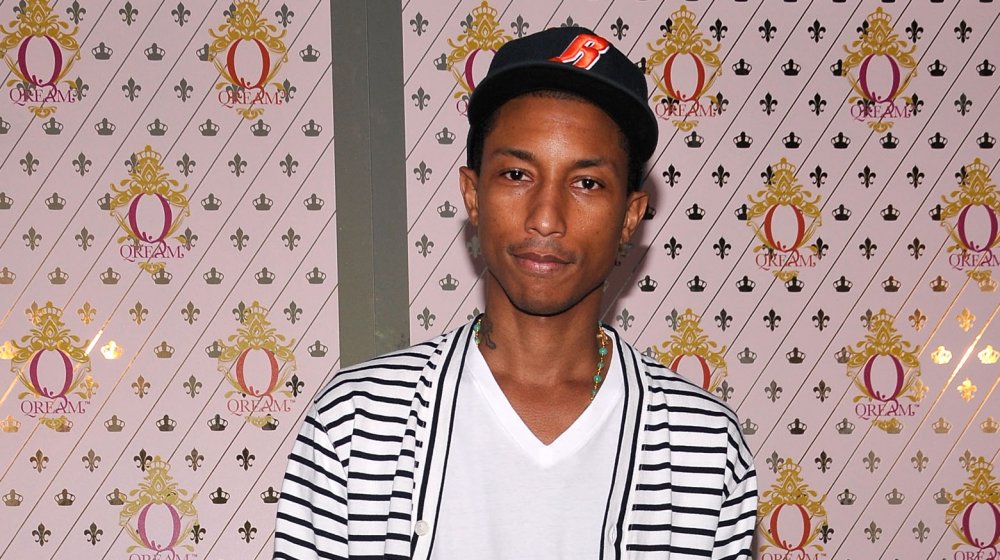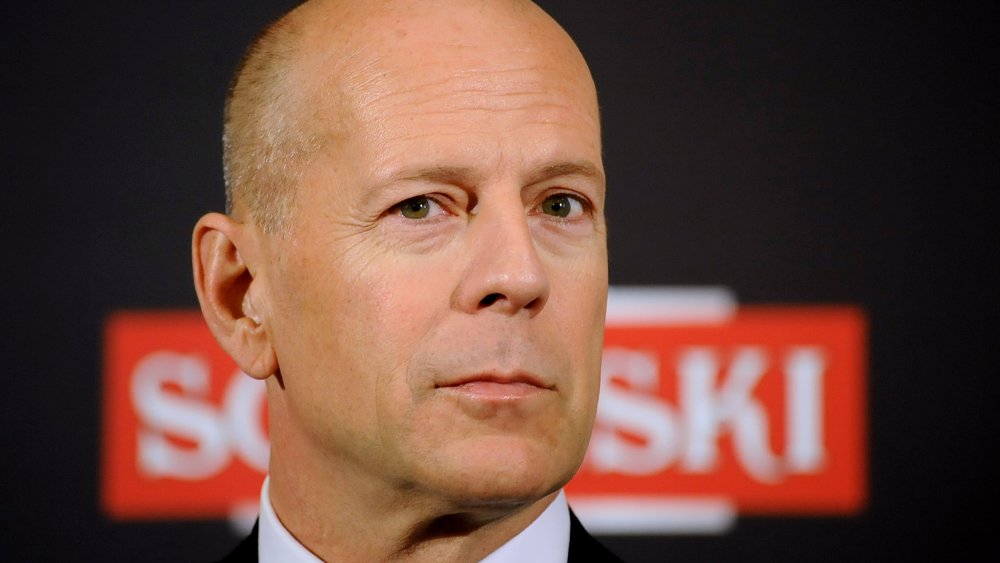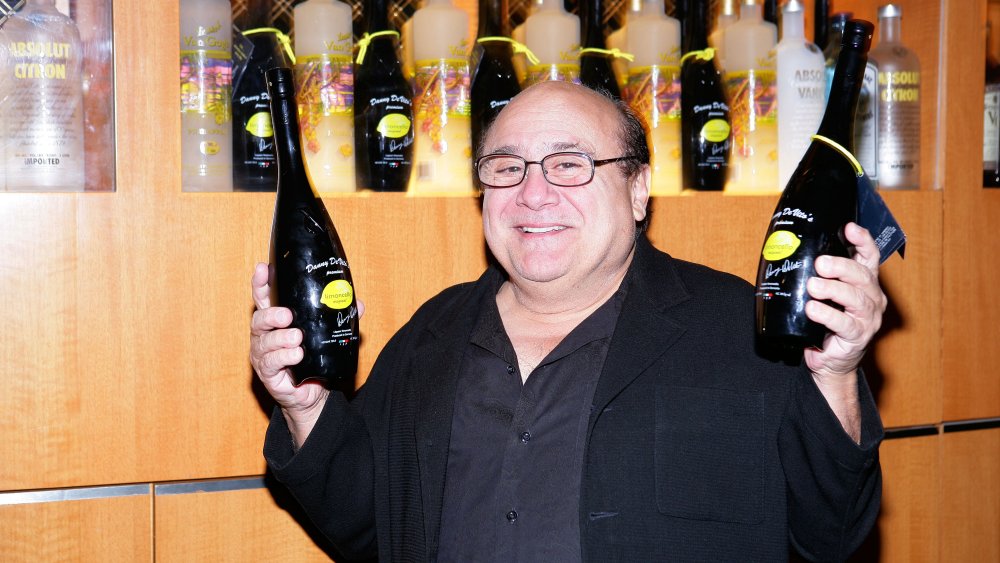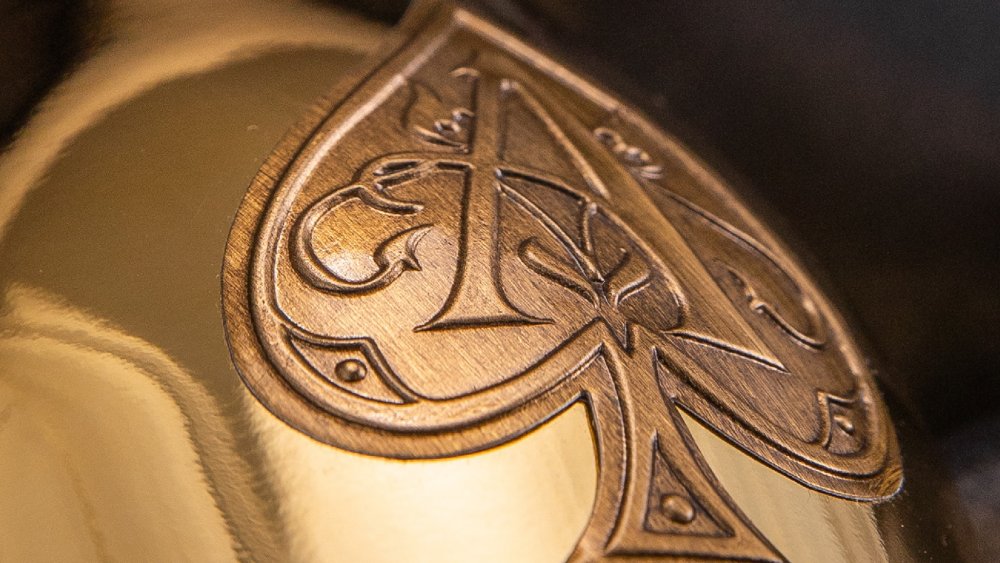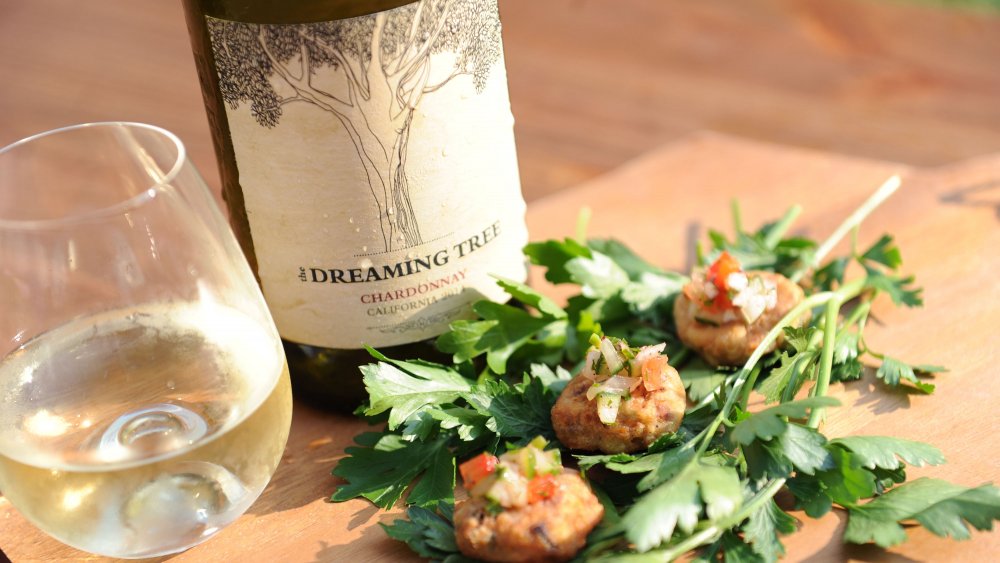The Truth About These Celebrity-Owned Alcohol Brands
Even if you have your tried-and-true favorite brands of vodka, gin, whiskey, rum, or other alcohol of choice, chances are pretty good that every so often, you want to try something new. And that brings us to celebrities.
There's a ton of celebrity-owned alcohol brands out there, but are they worth trying? And what's the real story? Did your favorite actors and musicians just get involved with buying a liquor brand to say they have one (and for the inevitable perks of some free cases)? Or did they take the time to do their research and actually invest more than cash?
The answers are a bit of a mixed bag. In some cases, celebs went all in. In other cases, maybe not so much. One thing's for sure: there's a shocking amount of money being thrown about when it comes to celebrity alcohols, so let's look at who's in the market, how involved they are, and just how much money has changed hands during some sales. Will it make a difference about whether or not you opt to buy a bottle or two? It just might.
Aviation Gin vs. Deadpool
Aviation Gin is based in Portland, Oregon, and in 2018, Ryan Reynolds acquired what RTE says is "an unspecified minority stake" in the company. Since then, he's become the face of the company ... which may have been more than they bargained for.
The same year, Espolón tequila "hired" his alter-ego, Deadpool, as their "creative director," which Variety says was partially done as a bit of promotion for Reynolds' then-upcoming Deadpool 2. Deadpool himself had a different take, saying: "I needed the money." Then, in the most meta thing ever, he took direct aim at Reynolds and Aviation Gin, saying, "[...] there is absolutely no reason why that Canadian gobstopper is getting all the glory. I'm a legit superhero. He's just some guy who's famous thanks to those two girls and that pizza place."
Reynolds' trolling himself wasn't just hilarious, it — along with a ton of other hilarious bits of marketing — worked. In 2020, Diageo — home of Guinness — bought Aviation Gin for a cool $610 million ... as long as it has continued success. The Drinks Business says the deal was $335 million upfront, with as much as $275 million over the next 10 years, depending on sales.
That explains Reynolds' post-sale, out-of-office email message, which read: "Thanks for your email. I am currently out of the office but will still be very hard at work selling Aviation Gin. For quite a long time, it seems."
Cameron Diaz's clean wine
In 2020, Cameron Diaz and her business partner, Katherine Power of Who What Wear, launched Avaline wine. When they spoke with Travel + Leisure about the two varieties they were starting with — white and rosé — they said that they'd made it a point to be involved with all parts of the process, because they wanted to make sure they were putting out a quality, all-organic product.
Distressed by the lack of transparency when it came to wine, Diaz says the goal is clean, organic wine. (And, in case you're wondering, they got the name Avaline out of a baby name book — it means humble and lively, they said.)
Diaz — a proponent of organic foods, non-toxic cleaning products, and responsible sourcing, put it this way: "What's been rewarding about creating Avaline is first how delicious the wine is. Along with the wine having to meet the standards of being organically grown grapes and the absolute minimal ingredients used in the winemaking process."
But there's the thing: the San Francisco Chronicle says that Avaline isn't as clean as they say, that it doesn't meet the standards for natural wine, and that the claims they're making aren't exactly true. Avaline is actually made with a number of ingredients — fining agents like pea protein and bentonite clay for clarification, commercial yeast, and a heavy-handed helping of sulfur dioxide — that actually disqualify it from being considered natural wine, that is, Vox says, wine made from grape juice and nothing else.
Sean Diddy Combs and Ciroc
Most people might recognize Sean "Diddy" Combs because of his music, but it wasn't music that put him at the top of Forbes's 2015 list of the highest-paid hip hop stars in the industry.
Combs, they say, has always been involved with companies selling everything from clothing to bottled water, but then Ciroc came along in 2007. "Ciroc was moving money, but not much. It was about a 30,000 cases-a-year brand," he told The Washington Post. At the time, Diageo was trying to get him to start his own brand, and he pitched doing something with Ciroc. Why? "I had tried it before. I knew it was made in France, and that it was extremely smooth." So, he took a chance and it worked: in 14 months, they were up to selling a million cases. Fast forward to 2015, and that had risen to two million cases and was coming in second only to Grey Goose in the high-end vodka market.
For him, it was about more than just vodka. "The thing about Ciroc is that it's helped diversify an entire industry. You have this industry, the high-end vodka industry, where there was almost no diversity. [...] Fifty-four percent of our sales are to people of color. The rest are to general market. So there's a mix."
Real crystals are used in Dan Akroyd's Crystal Head vodka
Let's be honest. There's one thing that catches your eye when you're perusing the shelves at the liquor store: the bottle. Even if you didn't know that Dan Akroyd had a stake in owning a vodka company, chances are pretty good you've seen — or even bought — his vodka just based on the clear glass bottle in the shape of a skull.
Crystal Head isn't just a gimmick, either — they say that part of what makes their vodka so smooth is that it's filtered seven times, and three of those times it's run through layers of semi-precious crystals. They're called Herkimer diamonds, and while Geology says they're not actually diamonds, they're a type of quartz that formed in the prehistoric caves beneath areas like Herkimer County, New York.
Akroyd founded Crystal Head in 2007, and according to The Drinks Business, they take that distinctive bottle very seriously. In 2019, a US appeals court confirmed that yes, the ceramic skull-shaped bottle used by a tequila company called KAH Tequila did, in fact, infringe on Crystal Head's trademark. The tequila's parent company, Elements Spirits Inc, was ordered to pay $871,536 in damages.
Channing Tatum's Born and Bred
The first time Channing Tatum drank vodka, he was around 13 years old, he told Bon Appetit. The drink he and his friend made was purple, and then, he said, "Shenanigans happened."
Tatum got a little smarter after that and somehow, still had a taste for vodka. But when he and a friend went on a search for a good, American-made vodka they came up lacking, save for Grand Teton. That was the clear winner that stood out from the rest of the pack and from there, it was just a matter of time before they came up with their own vodka recipe, distilled from Idaho potatoes and water from the Grand Teton mountains.
Born and Bred was the result, and for the record, Tatum has said that Russians wouldn't like it ... he thinks. "I haven't talked to a lot of Russians about this, but I have gotten pretty good feedback and I don't think they would like our vodka. They do think vodka should burn."
One thing you'll notice right away is the strange creature on the label. That's a jackalope, and Tatum says they picked that as their mascot "because I'm sort of obsessed with trickster archetypes." And don't forget to check the inside of the label. There's a message there, and it says "Cross my heart and hope for mischief." That, Tatum says, is what he hopes everyone finds in a bottle: "a little havoc, [...] some safe, manageable mischief."
Tequila created the highest-paid actor in the world
Something strange happened in the entertainment world in 2018: according to Business Insider, George Clooney was announced as the highest-paid male actor in the industry ... although he wasn't even in a movie that year. How? He sold his Casamigos tequila company for $1 billion, netting himself a $239 million paycheck.
He later said (via Business Insider) that he was still going to be very hands-on with the company, "Starting with a shot tonight. Maybe two."
That's not entirely surprising when you consider that he says it was never about making money, it was about creating the perfect tequila: they wanted something super smooth, with a flavor profile they loved, and "that we could drink all day long and not be hungover in the morning." Priorities!
It took them two years — and 700 samples later — before they settled on the right one. When they did, they ordered so many bottles that the distiller told them they needed a license for it, so they decided to share the aptly named tequila — which means "House of Friends" — with the world. The billion dollars? That was just gravy.
Drew Barrymore: Vintner
Back in 2010, Drew Barrymore started her own Barrymore Wines in conjunction with Carmel Road of Jackson Family. Her wines, Vogue says, are pure California: and she's been there every step of the way.
"I really am trying to educate myself rather than just drinking," she said in a 2017 interview. "I really want to know the exact notes that each glass or label or vineyard or varietal has. I get inspired by that. [...] Wine is exploration; it's travel; it's education; it's transportation, bringing you to another time and place."
Haute Living also noticed how hands-on she is: When they went to the Pebble Beach Food and Wine Festival, they were pleasantly surprised to see her there, mingling, chatting, and pouring the wine she produced with the help of winemaker Kris Kato. The two collaborate on every aspect of the wine — taste, smell, color — and while his contribution is the technical expertise, hers is picking and choosing characteristics, tastes, flavors, and colors from the wines she's tried from vineyards around the world. It's living proof that it's all about the passion. Will there be more varieties? Without a doubt.
What happened to Pharrell Williams's Qream with a Q?
Pharrell Williams believed there was something missing in the liqueur market: "a touch of indulgence," according to Billboard. In 2011, he launched Qream with a Q, and he made no secret of the fact that he was marketing the Strawberry Creme and Peach Creme liqueurs just to the ladies.
"When we looked at the market, there were all these alcohol brands that use women in their ads but nothing specifically for them. That's what we created Qream for. We're bringing indulgence back to the ladies."
Also important? Not creating a product that was too heavy, because of the ladies' obsession with being thin. (No joke: Williams added, "Everywhere you turn it's like, 'I gotta lose weight!' [...] I wish I had invested in Spanx when they first started!")
You're not going to find Qream with a Q on shelves anymore, though. In 2013, Williams sued Diageo North America, claiming that it was Diageo who dropped the ball, leading to their July 2012 announcement that they were going to be discontinuing the product. His problems included their marketing of the drink and the tops of the bottles, which was what he claimed led to the liqueur's failure (via All Hip Hop).
What happened to Bruce Willis's stake in Sobieski?
Sobieski Vodka is massively popular in Poland, and in 2010, PR Newswire reported that they were making a serious push into the North American market with the help of a spokesperson who also owned a 3.3 percent stake in the company.
That was Bruce Willis, and Willis was heading out on a nationwide tour called "Truth in Vodka" with them. The idea was basically that you didn't have to be trendy and gimmicky to make good vodka, and that Sobieski was more interested in tradition and their heritage than fancy bottles and flashy ads.
Fast forward a few years, and The Wall Street Journal was reporting that it wasn't going well. In 2012, Sobieski's owner, Belvedere SA, was trying to figure out how to restructure their whopping $976.9 million in debt. For Willis, it was over $20 million that was at stake, with Belvedere saying that they simply wouldn't be able to pay. Willis? He sent his lawyers.
Danny DeVito, limoncello, and sharing too much on TV
Danny DeVito is a national treasure and must be protected at all costs. That said, it's also worth noting that you can never really be sure what you're going to get with him, and he proved that in 2006 with a very strange appearance on The View. That's where he sat on some laps and shared the fact that he and then-wife Rhea Perlman had gotten frisky in the Lincoln Bedroom, which is honestly more of the quality television programming we need.
DeVito later chalked up the weird appearance to limoncello, and a night out with George Clooney. Apparently, Clooney later told People that he had been out with "an actor recently," one who had a "big, big heart." They'd gotten pretty hammered on limoncello, and both had TV appearances the next day that were more than a little challenging.
It also seems as though DeVito has a soft spot for limoncello, heading up his own brand of aptly-named Danny DeVito's Premium Limoncello. Though reviews of the drink were largely positive, it seems to have gone the way of the dodo.
Jay-Z, a boycott, and his own brand
Way back in ye olden days of the early 2000s, The Guardian says that hip-hop was first "becoming synonymous with conspicuous consumption." That's about the time Cristal started making it into lyrics, and for a while, it was all fine. Then, the managing director of Cristal manufacturer Louis Roederer made this comment to the Economist when asked about the connection: "That's a good question, but what can we do? We can't forbid people from buying it. I'm sure Dom Perignon or Krug would be delighted to have their business."
Ouch. If you think that's not cool, you're not the only one: Jay-Z came out fast and said that he was not just encouraging a boycott, but that he was pulling Cristal from his bars. Then, he went one step further and in 2014, bought Champagne Armand de Brignac, a few years after it made an appearance in his video for "Show Me What You Got." They only produce around 60,000 bottles a year, and Jay-Z's favorite — the Blanc de Noirs — retailed for $850 a bottle. Not pricey enough? In 2019, Food & Wine announced the release of Blanc de Noirs Assemblage Three, for a suggested retail of $1,000 a bottle.
Decanter suggests that the content of those bottles are "quite impressive."
Dave Matthews has super-sustainable wines
Dave Matthews launched The Dreaming Tree Wines in 2011, and he did it in collaboration with winemaker Sean McKenzie. It wasn't just about a tasty wine that everyone could afford, it was about an ultra-sustainable, environmentally friendly wine ... that everyone could afford.
Their California winery is a part of the California Sustainable Winegrowing Alliance, and they're serious about making a difference. In addition to the 17,000 solar panels that power their four wineries, they're also doing things like making labels from 100 percent recycled kraft brown paper and making bottles that are a quarter pound lighter than the average.
And there's more: just six years after launch, PR Newswire announced they'd hit a major milestone and donated $1 million to environmental organizations like The Wilderness Society and Living Lands & Waters. Those donations have gone to programs like the MillionTrees Project, which was responsible for planting native species along the Mississippi River Basin in an attempt to help preserve the natural habitat there and combat things like erosion. Want to do some good while you're picking out a nice bottle? Matthews and McKenzie are making sure you can.
